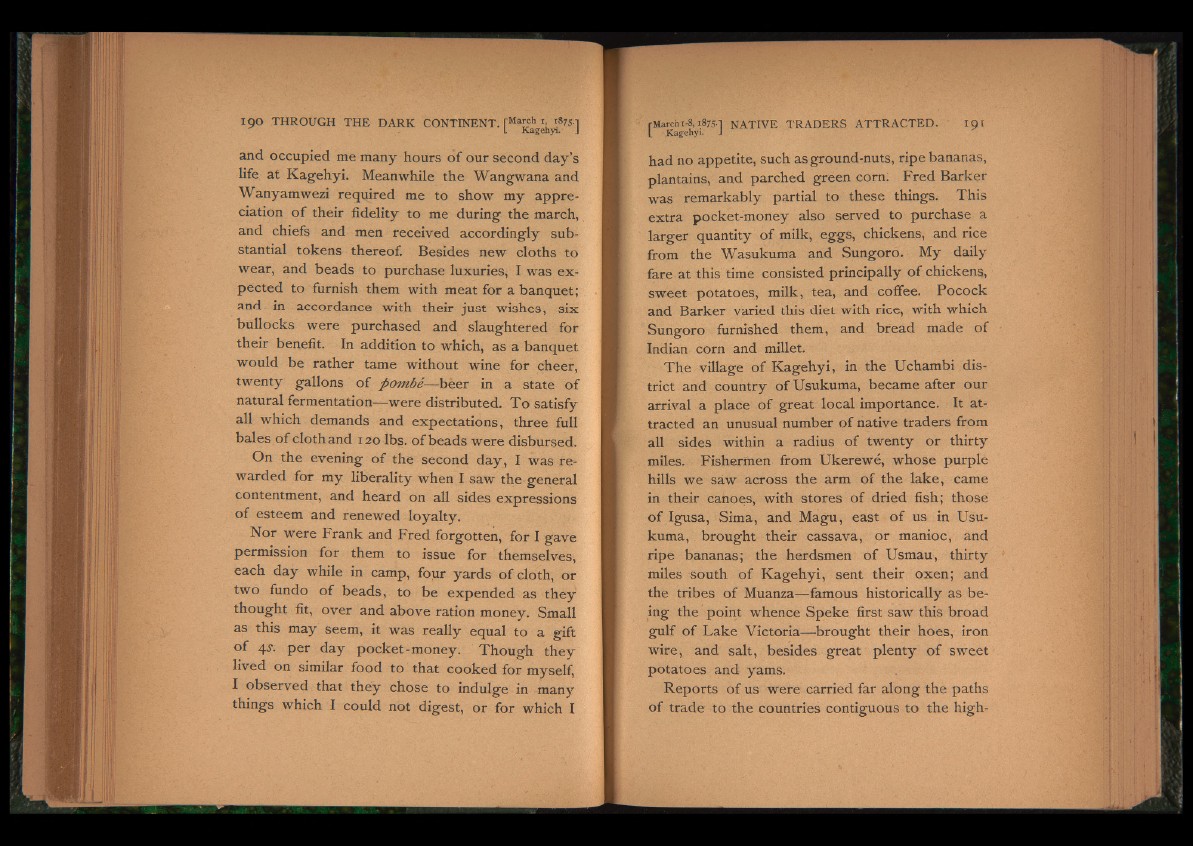
and occupied me many hours o f our second d ay’s
life at Kagehyi. Meanwhile the Wangwana and
Wanyamwezi required me to show my appreciation
o f their fidelity to me during the march,
and chiefs and men received accordingly substantial
tokens thereof. Besides new cloths to
wear, and beads to purchase luxuries, I was e x pected
to furnish them with meat for a banquet;
and in accordance with their just wishes, six
bullocks were purchased and slaughtered for
their benefit. In addition to which, as a banquet
would be rather tame without wine for cheer,
twenty gallons o f pom be— beer in a state o f
natural fermentation— were distributed. T o satisfy
all which demands and expectations, three full
bales o f clothand 120 lbs. o f beads were disbursed.
On the evening o f the second d ay , I was rewarded
for my liberality when I saw the general
contentment, and heard on all sides expressions
o f esteem and renewed loyalty.
Nor were Frank and Fred forgotten, for I gave
permission for them to issue for themselves,
each day while in camp, four yards o f cloth, or
two fundo o f beads, to be expended as th ey
thought fit, over and above ration money. Small
as this may seem, it was really equal to a gift
o f 4^. per day pocket-money. Though they
lived on similar food to that cooked for myself,
I observed that th ey chose to indulge in many
things which I could not digest, or for which I
(•March 1-8,1875.-) NATIVE TRADERS ATTRACTED. 191
L Kagehyi. J
had no appetite, such as ground-nuts, ripe bananas,
plantains, and parched green corn; Fred Barker
was remarkably partial to these things. This
extra pocket-money also served to purchase a
larger quantity o f milk, eggs, chickens, and rice
from the Wasukuma and Sungoro. My daily
fare at this time consisted principally o f chickens,
sweet potatoes, milk, tea, and coffee. Pocock
and Barker varied this diet with rice, with which
Sungoro furnished them, and bread made o f
Indian corn and millet.
The village o f K a g eh y i, in the Uchambi district
and country o f Usukuma, became after our
arrival a place o f great local importance. It attracted
an unusual number o f native traders from
all sides within a radius o f twenty or thirty
miles. Fishermen from Ukerewe, whose purple
hills we saw across the arm o f the lake, came
in their canoes, with stores o f dried fish; those
o f Igusa, Sima, and Magu, east o f us in Usukuma,
brought their cassava, or manioc, and
ripe bananas; the herdsmen o f Usmau, thirty
miles south o f K a g eh y i, sent their oxen; and
the tribes o f Muanza— famous historically as being
the point whence S p ek e first saw this broad
gulf o f L a k e Victoria— brought their hoes, iron
wire, and salt, besides great plenty o f sweet
potatoes and yams.
Reports o f us were carried far along the paths
o f trade to the countries contiguous to the high